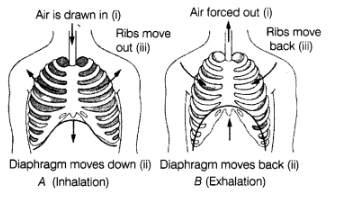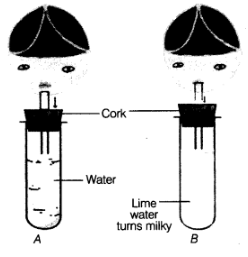Class 7 Science Chapter 6 HOTS Questions - Respiration in Organisms
Q1: Why do people often breathe out on the spectacles to clean them?
Ans: The warm and moist exhaled air condenses on the surface of spectacles as water vapor. Thus, making spectacles wet helps to clean them easily with the help of a cloth.
Q2: Analyze the role of the diaphragm in the breathing process and its impact on lung volume and air pressure.
Ans: .The diaphragm is a dome-shaped muscle that helps in breathing.
- During inhalation, it contracts and moves downward, increasing lung volume and decreasing air pressure, causing air to flow into the lungs.
- During exhalation, it relaxes and moves upward, decreasing lung volume and increasing air pressure, pushing air out of the lungs.
The diaphragm's movement thus directly impacts lung volume and air pressure, making it essential for efficient breathing and gas exchange.
Q3: There are three animals named A, B, and C. Among them, A can stay on land as well as in water. When it stays on land, is respires through its lungs, but when it goes into water, it respires through its moist skin. Animal B has specific organs to respire in the water, which is not found in any other water animal. While animal C is a water animal, which respires through nostrils and lungs. Now give the name of animal A, B, and C.
Ans:
- Animal A can live on land as well as in water and can respire through lungs as well as moist skin. The animal is a frog.
- Animal B lives in water and respires through a specific organ called gills. These are found in the tadpoles besides the fishes. The animal B is a fish.
- Animal C is also an aquatic animal, which lives in sea water and respires through nostrils and lungs, not by the gills. The animal is the whale.
Q4: Sometimes when we do heavy exercise, anaerobic respiration takes place in our muscle cells. What is produced during this process?
(a) Alcohol and lactic acid
(b) Alcohol and CO2
(c) Lactic acid and CO2
(d) Lactic acid only
Ans: (d) Lactic acid only
Q5: Why do we feel relieved after a massage of the pain in the leg muscles due to cramps?
Ans: Massage improves the circulation of blood leading to an increased supply of oxygen in the muscle cells, which helps in a complete breakdown of lactic acid into C02 and water. Thus, helps in relieving the pain.
Q6: On a very cold morning, Boojho and Paheli were talking with each other as they walked down to their school. They observed that the air coming out of their mouth looked like smoke. They were assumed and wondered how it happened. Help them to find the answer.
Ans: On a cold day, the warm and moist air exhaled by us condenses into moisture when it comes in contact with the cold air of the atmosphere, this looks like white smoke.
Q7: Whenever we feel drowsy or sleepy, we start yawning. Does yawning help us in any way?
Ans: When we feel drowsy, sleepy or tired, we yawn (i.e. open our mouth wide to take a long and deep breath of air), because our breathing rate slows down and our body does not receive sufficient oxygen.
Q8: Discuss how the structure and function of fish gills differ from human lungs in facilitating respiration in their respective environments.
Ans: Fish gills and human lungs are both specialized structures for gas exchange, but they are adapted to different environments. Fish gills are designed to extract oxygen from water, whereas human lungs extract oxygen from air. The key difference is that fish gills are adapted to extract dissolved oxygen from water, while human lungs are adapted to extract gaseous oxygen from air.
Q9: During the process of exhalation, the ribs move
(a) down and inwards
(b) up and inwards
(c) down and outwards
(d) up and outwards
Ans: (a) down and inwards
Q10: Fish breathe with the help of gills which are richly supplied with blood vessels. The gills help the fish to
(a) take in oxygen from air
(b) take in oxygen dissolved in water
(c) absorb the nutrients present in the water
(d) release waste substances in the water
Ans: (b) take in oxygen dissolved in water
Q11: Smoking is considered harmful due to certain effects. Explain in brief.
Ans: Lungs are very delicate organs and essential for breathing, thus keeping us alive. Smoking tobacco in the form of beedi, cigarette or cigar damages our lungs gradually and causes ill health. While smoking, the smoke along with chemicals present in tobacco enters our body. These chemicals present in tobacco damage the lungs in many ways, such as breathing becomes difficult, cause lung cancer, and heart diseases, etc. Smoking also affects people around smokers as they also inhale air containing tobacco. This is called passive smoking.
Q12: List some animals around you. Now group them as follows:
(a) Animals that can breathe only through the skin.
(b) The animal that can breathe through skin as well as through lungs.
(c) The animal that can breathe through the lungs.
(d) Animals that can breathe through gills.
(e) Animals that can breathe through spiracles and tracheae?
Ans:
(a) Animals that can breathe only through the skin are earthworms and leeches.
(b) Animals that can breathe through skin as well as through lungs are frogs.
(c) Animals that can breathe through lungs are buffaloes, humans, and dolphins.
(d) Animals that can breathe through gills are tadpoles and fish.
(e) Animals that can breathe through spiracles and tracheae are grasshoppers, cockroaches, ants, houseflies, and mosquitoes.
Q13: Observe the given figures as A and B and answer the following questions.

Respiration in Organisms Class 7 Extra Questions Science Chapter 10 8
(a) Among both figures, identify which A or B indicates the process of inhalation and which shows the process of exhalation?
(b) In the figure label the arrows and indicate the direction of
- movement of air
- movement ofthe diaphragm
- movement of ribs
Ans:
(a) Figure A indicates inhalation and Figure B indicates exhalation.
(b) Movement of air, diaphragm, and ribs are indicated inthe below figure:

Q14: Paheli participated in a 400 m race competition held at her school and won the race. When she came home, she had mixed feelings of joy and pain as she had cramps in her leg muscles. After a massage, she was relieved of the pain. Answer the following questions related to the situation.
(a) What can be the possible reasons for the pain in her legs?
(b) Why did she feel comfortable after a massage?
Ans:
(a) Paheli had cramps in her leg muscles after running. She felt pain in her legs because of the accumulation of lactic acid in the leg muscles. Lactic acid is formed due to anaerobic respiration in the muscle cells after heavy exercise or running. After heavy exercise, we require a large amount of energy.
To produce more energy to meet the oxygen requirement of muscles, muscle cells perform anaerobic respiration for a short duration.
Lactic acid is formed due to partial breakup of glucose. It gets accumulated in the muscle cells and causes pain and muscle cramps.
(b) The massage or hot water bath gives relief from muscle cramp or pain, because it improves the circulation of blood, leading to an increase in the supply of oxygen to the muscle cells. It helps in complete breakdown of lactic acid into carbon dioxide and water.
Q15: A person put some warm water in an aquarium having fish during the winter season. He thought that fish would be more comfortable in lukewarm water than cold water. But he observed that the fishes in the aquarium died. Why do the fishes die in warm water?
Ans: Fish use gills to absorb oxygen from water, which is then distributed to the body through blood vessels. Since water has less oxygen than air, aquatic animals breathe faster. If warm water is added to an aquarium, the dissolved oxygen escapes into the atmosphere because gases are less soluble in warm water. This lack of oxygen makes it hard for fish to breathe, potentially causing them to die.
Q16: Pick the odd one out from each of the groups given below based on respiratory organs. Give reason for your answer.
(a) Cockroach, grasshopper, snail, ant
(b) Lizard, cow, earthworm, snake
(c) Crocodile, whale, dolphin, fish
(d) Snake, tadpole, crow, goat
Ans:
(a) Snail, as it does not breathe using trachea.
(b) Earthworm, because it breathes through its skin and it does not have lungs.
(c) Fish, as most fish breathe through their gills and do not have lungs.
(d) Tadpole, as it breathes through gills and does not have lungs.
Q17: Observe the figures and answer the following questions.

(a) Which process is being tested in the activity?
(b) What is the result of the activity? Give reasons.
Ans:
(a) The exhalation process of respiration is being tested in the activity.
(b) The lime water in test tube B turns milky but water in test tube A remains unchanged. Because CO2 is present in the exhaled air, it mixes with lime water in test tube B and turns it milky.
Q18: What is the difference between pores present in insects and leaves of a plant?
Ans: Pores in insects are known as spiracles whereas pores in the leaves of a plant is known as stomata. The differences between these two pores are:
- Spiracles are present on the sides of insects’ bodies, whereas stomata are present more on the lower surface of leaves and fewer on the upper surface of leaves.
- Spiracles lead to an extensive network of tracheal system, which is absent in the leaves.
- Spiracles are fewer in number as compared to stomata.
Q19: Why do we yawn, especially when we feel drowsy and sleepy?
Ans: When we feel drowsy or sleepy, our breathing rate slows down. The lungs do not get enough oxygen from the air, resulting in yawning. Yawning brings extra oxygen into the lungs.
Q20: On a very cold morning, Radhika was amused and wondered to see that the air coming out of her mouth looked like smoke. Help her to find the answer.
Ans: On a cold day, when warm and moist air comes in contact with the cold air outside, it condenses into mist. This looks like smoke.
|
111 videos|286 docs|28 tests
|
FAQs on Class 7 Science Chapter 6 HOTS Questions - Respiration in Organisms
| 1. What is respiration and why is it important for living organisms? |  |
| 2. What are the different types of respiration in organisms? |  |
| 3. How do plants respire? |  |
| 4. What is the role of the respiratory system in humans? |  |
| 5. How do different organisms adapt their respiratory processes in varying environments? |  |

















